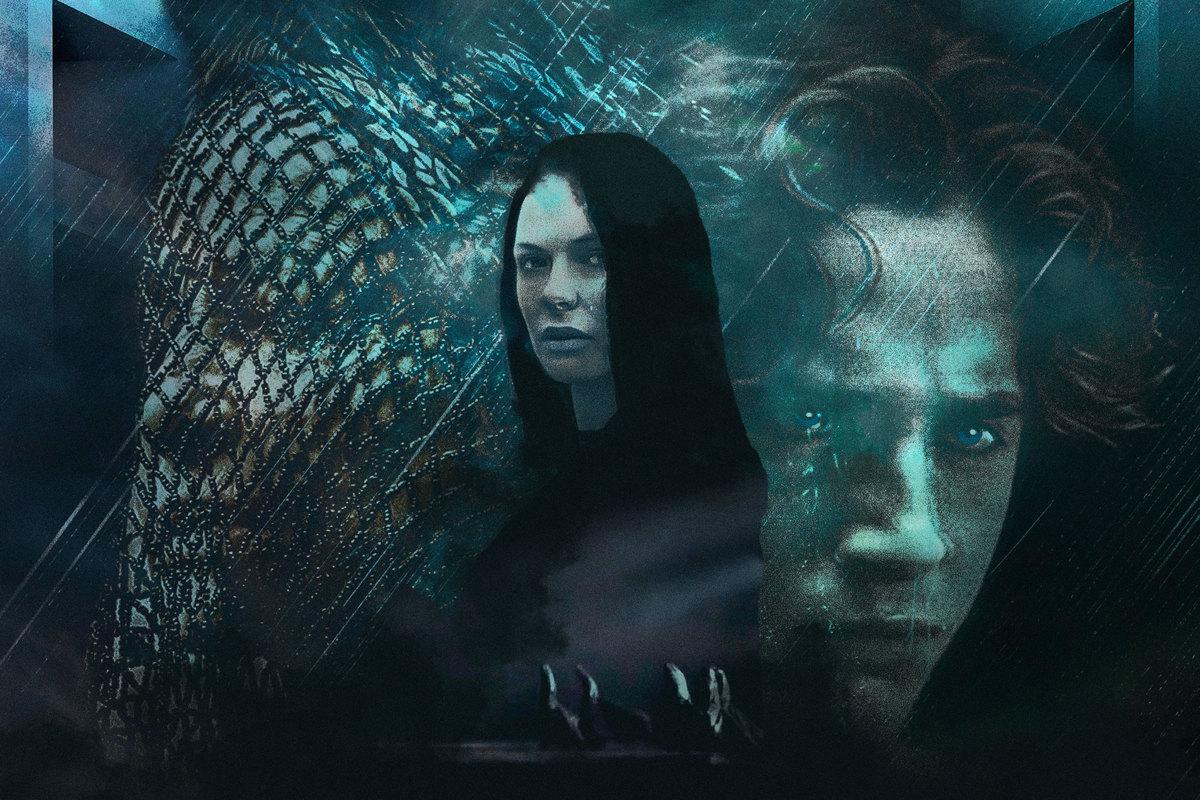
There are three male-dominated factions driving the events of both Frank Herbert’s novel and Denis Villeneuve’s film adaptation Dune. There’s the cerebral House Atreides (think Vulcans, Athens, or House Martell), the brutish, warlike House Harkonnen (think Klingons, Sparta, or House Bolton) and a corrupt, unseen emperor named Shaddam Corrino IV. But even the most casual viewer of Villeneuve’s film, which covers roughly half of Herbert’s novel, might notice that the real power pulling the strings in this universe is a group of mysterious women with a fondness for black robes and statement hats known as the Bene Gesserit.
Film adaptations, by their nature, have less room for subtlety than a lengthy novel, so while the Bene Gesserit are content to guide and shape the political path of the galaxy from the shadows in Herbert’s text, they’re more overtly powerful in Villeneuve’s film. Not only do characters speak of the Bene Gesserit in hushed, superstitious tones, but the women—led, onscreen, by Charlotte Rampling’s Reverend Mother Mohiam—do not hesitate to order the most powerful men in the galaxy around.
What are they up to and how do they work? The answer to that question illuminates one of the most intriguing aspects of Dune: the complete upending of a worn-out chosen one narrative. And if Villeneuve has a chance to tell the rest of this story, audiences might see that all the chosen one stories that stole liberally from Dune neglected to include Herbert’s biting critique of them.
If you’ve spent any time in the Western canon in the past few hundred years, you can spot a chosen one a mile away. It’s easy to see how Paul Atreides (Timothée Chalamet) fits snugly in the mold that churned out Harry Potter, Luke Skywalker, Buffy Summers, Jon Snow, Neo, and the rest. (Villeneuve even gives his Paul a Binary Sunset moment.) Paul’s got the complete chosen one starter pack: fiery prophetic dreams, an uncanny knack for picking up new skills, full marks on a lethal pop quiz he didn’t study for, a dead parent, and an enviable head of hair. But here’s the fun thing about Paul Atreides: He was never supposed to be the one. This is why, in the film, Reverend Mother Mohiam is so furious when she gives Paul that disturbing poison needle test.
In Herbert’s world, the Bene Gesserit are sometimes (usually by men) called witches—and, to be fair, they do cultivate some otherworldly abilities. Herbert sees them more as a religious order: Gesserit is derived from Jesuit. But despite some of those supernatural abilities—like the Voice that compels obedience and the ability to peer into the past—the Bene Gesserit have never sought direct, overt power. They prefer, instead, to use subtler, long-gestating influence to achieve their goals. As Baron Harkonnen famously says in the book: “Plans within plans within plans.”
The largest (and, let’s face it, creepiest) element of the Bene Gesserit plan is something they call the breeding program. There are a few different roles in the order. One might be a powerful Reverend Mother, a Truthsayer (who can detect any lie), or, like Rebecca Ferguson’s Jessica, a hardworking Sister who serves as concubine, spy, and sometimes even as a wife. It’s an honor to train at a Bene Gesserit school and many high-born women are conscripted into service during their studies and sent back into the world with specific orders to “breed” with and/or marry certain powerful men. The goal? To mix and mingle certain bloodlines into a messiah cocktail that will create one male super-being known, delightfully, as the “Kwisatz Haderach.” (It’s a phrase best hissed menacingly à la Rampling.)
The Bene Gesserit have the ability to look back at past generations of female members of the sisterhood and learn directly from their history. The male history is inaccessible to them. The Kwisatz Haderach would have access to both. He wouldn’t be just any messiah, but one fully in their control. If that breeding mandate sounds disturbing to you, Jessica might agree: In Herbert’s novel she bitterly calls herself “a broodmare preserving an important bloodline for the Bene Gesserit plan.”
Jessica was ordered to breed with Duke Leto Atreides and produce a daughter. (A fun fact that might put Texas lawmakers off their T-bones is that the Bene Gesserit can control when they do and don’t get pregnant as well as what the sex of the child will be.) The sisterhood have identified the politically prominent and affluent House Atreides as a desirable bloodline and, in a twist Villeneuve appears to be saving for the sequel, Jessica, unknowingly, has some powerful blood coursing through her veins as well. But Jessica accidentally fell in love with her duke—not hard to figure out why when he looks like Oscar Isaac—and gave him a son instead. That act of disobedience reverberates throughout history and becomes known as the Jessica crime.
Jessica not only breaks the rules by having a son, but she also has the audacity to train that son in the ways of the Bene Gesserit. Jessica’s lessons are responsible for much of what makes Paul special. “[Paul] learned rapidly because his first training was in how to learn,” Herbert’s novel explains. But that training comes with a cost when Paul’s powers fully kick in. “Did you know what you were doing when you trained me?” Paul accuses Jessica angrily in the novel just after his father’s death. “You didn’t want a son. You wanted a Kwisatz Haderach. You wanted a male Bene Gesserit.”
Paul’s accusation that Jessica was just in it for the power-grab goes hand-in-hand with how women are portrayed in Dune. That question seemed to be on Villeneuve’s mind, at least—and though he is a self-proclaimed Frank Herbert fanatic, it’s not unreasonable to suggest a book written 60 years ago could use an update. In Villeneuve’s version, Dr. Liet Kynes, judge of the change, is gender-swapped and played by Sharon Duncan-Brewster. Jessica Atreides, too, gets a significant overhaul. Ferguson plays her less as ambitious and more as emotionally protective of her son and husband—her frantic fear during Paul’s trial remains one of the film’s most arresting moments. “Denis was very respectful of Frank’s work in the book, [but] the quality of the arcs for much of the women have been brought up to a new level,” Ferguson told Vanity Fair.
In the book, Paul’s powers show up fully just after Duke Leto dies. (Classic chosen one timing.) But the chapter in which he and Jessica huddle together in a tent in the middle of the desert plays out very differently in Villeneuve’s film, and it’s not hard to see why. In the novel, Paul becomes this other thing awakened by both his exposure to spice, the glitter sand of Arrakis, and the trauma of his father’s death. Among other gifts, Paul can see “the available paths” of the future. But he also loses touch with his emotions, to the point that he’s unable to mourn his father. (That coldness is also one of the many reasons Kyle MacLachlan’s Paul Atreides is so hard to latch on to in David Lynch’s 1984 adaptation.) Villeneuve chose, instead, to linger a bit longer in Paul’s humanity and let those Chalamet tears flow. But eventually, yes, Jessica’s son will become a messiah figure known as the Muad’Dib, which is the Fremen name of the little desert mouse that so fascinates Paul in Villeneuve’s film.
As if this careful construction of a messiah via bloodline breeding and childhood training weren’t enough to grease the wheels for Paul Atreides, the Bene Gesserit sisterhood had one more clever trick up their black, flowing sleeves: propaganda. In one of Dune’s many appendices, Herbert evocatively describes the Missionaria Protectiva as the sisterhood’s “black arm of superstition.” For generations, members of the Bene Gesserit have planted prophecies in what they consider “primitive” cultures in order to prime the pump for their eventual chosen one to be welcomed with open arms. Cleverly, the prophecies are vague enough that they might apply to any old bright-eyed would-be messiah. “He shall know your ways as if born to them” is a snippet of the prophecy Dr. Liet Kynes recalls when Paul knows how to strap on the Fremen stillsuit. But, really, how many ways are there to strap on a stillsuit?
This is a brilliant blow to the chosen one narrative. Imagine if iconic fantasy prophecies like “the prince who was promised” or “neither can live while the other survives” turned out to simply be propaganda planted long ago? Paul is gifted, sure, but because of the groundwork laid by the sisterhood, the Fremen of Arrakis are ready to believe he is their savior (the prophesied “Mahdi”) the moment he lands on the planet with his Bene Gesserit mother.
“I recognize you,” Javier Bardem’s Fremen leader Stilgar says when he first meets Paul. Stilgar and his people have been waiting for the Mahdi’s arrival their whole lives. In the end, that prophecy saves Paul and Jessica when they are thrown out into the wilderness. “We’ll find a home among the Fremen,” Paul says in the book, “where your Missionaria Protectiva has bought us a bolt hole.” Ironically, however, Paul’s alliance with the Fremen—strengthened by his love affair with literal dream girl Chani (Zendaya)—is precisely what guarantees his freedom from Bene Gesserit control. Why follow their agenda when he and the Fremen can create their own?
In his novel, Herbert took this idea of the persuasive power of propaganda a layer deeper by beginning nearly every chapter with some passage or quote from “The Collected Sayings of the Muad’Dib” or the “Manual of the Muad’Dib.” Readers are aware from the start that the Muad’Dib is Paul and so his destiny as some kind of historically important holy figure is meta-textually consecrated, chapter after chapter, by these writings. We believe Paul should be important because everything keeps telling us he already is.
“The person who experiences greatness must have a feeling for the myth he is in,” one of the Muad’Dib sayings reads. “He must reflect what is projected upon him. And he must have a strong sense of the sardonic. This is what uncouples him from belief in his own pretensions.”
But Paul, of course, wasn’t the messiah the Bene Gesserit had planned. He winds up becoming something the sisters, in all their infinite wisdom, didn’t see coming. “You’re thinking I’m the Kwisatz Haderach,” he tells his mother in the book. “Put that out of your mind. I’m something unexpected.” What was the intended endgame for the Bene Gesserit and their brilliant, almost-got-away-with-it plan to genetically engineer an intergalactic Jesus? In Herbert’s book, Paul thinks he sees their intentions clearly:
He had seen a warrior religion there, a fire spreading across the universe with the Atreides green and black banner waving at the head of fanatic legions drunk on spice liquor…He found that he could no longer hate the Bene Gesserit or the Emperor or even the Harkonnens. They were all caught up in the need of their race to renew its scattered inheritance, to cross and mingle and infuse their bloodlines in a great new pooling of genes. And the race knew only one sure way for this—the ancient way, the tried and certain way that rolled over everything in its path: jihad.
Initially, Paul rejects a path that would lead to holy war. “I can’t go that way,” he tells Jessica in the novel. “That’s what the old witches of your school really want.” (Villeneuve tries to capture the essence of this jihadi future in several of Paul’s visions in which he sees an “unquenchable fire” and himself, clad in golden armor, leading an army into battle.)
However violent their approach may be, the Bene Gesserit, ultimately, desire stability. Before Jessica went rogue, their original plan included putting a Bene Gesserit on the imperial throne by ensuring the emperor’s wife (secretly a member of their order) gave birth only to daughters. They also planned to breed their puppet messiah, the Kwisatz Haderach, from Jessica Atreides’s daughter and one of Baron Harkonnen’s nephews. (Villeneuve has yet to cast this character, Feyd-Rautha, but Sting memorably played him wearing only a metal diaper in Lynch’s film.) This union of House Atreides and House Harkonnen would, the Bene Gesserit believed, create peace in the galaxy.
Are the Bene Gesserit evil, then? Unlike the truly despicable Baron Harkonnen, it’s hard to say, and viewers will have to make their own assessments. The Bene Gesserit genuinely think their way is the right path forward for humanity. Then again, so do all zealots.
But as dusty as some of Herbert’s scenarios may seem, especially in light of all the famous genre fiction he’s inspired over the past half-century, his preoccupation with how politics, science, commerce, and religion are used to manipulate humanity’s path keeps Dune as relevant as ever. As for the chosen one, well, suffice it to say that Paul’s ending isn’t necessarily a happy one. Or did you miss the fire imagery? The bottom line remains that if Villeneuve gets a chance to tell the rest of the Dune saga, Harry Potter, Luke Skywalker, Jon Snow, and the rest of our beloved genre heroes will look like what they are: simplified photocopies of Frank Herbert’s deeply complicated original.

